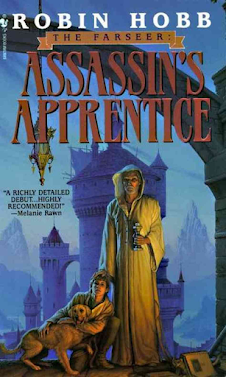What is the most surprising book you’ve read in the last few years?
This week's question is a tough one. As we all have, I've read so many books that moved me to tears, annoyed me, got me angry, feeling dejected, feeling positive - all shades of the rainbow. But what's been the most surprising? I had to think for a long while.
And then, when I got the answer, I was surprised - how obvious it seemed in hindsight.
So, dear readers, wherever you are - here is my most surprising recent read. Although I picked up the first in the series over ten years back, it's still the only book that comes way at the top of my list.
And that would be Robin Hobb's Farseer series - starting with the first book of the first trilogy, Assassin's Apprentice, and going all the way to the last book in the last trilogy, Assassin's Fate.
For those of you who love discovering new series and authors, you're in for a real treat if you haven't read Hobb yet - while I like her other work, including the Soldier's Son series (set in a different time and space), and the Liveship series (set in the same world as the Farseer series, but with a different set of characters) - I don't think they hold a candle to her other Farseer series: beginning with the Farseer Trilogy, and then moving to the Tawny Man Series, then the Rain Wild Chronicles, and finally, the Fitz and the Fool trilogy.
So many books. And surprising, I said. Why surprising?
Apart from writing 1920s historical mysteries, in my alter life I am an ecologist. As someone who teaches one of the classic dismal disciplines, speaking of topics as grim as climate change, biodiversity collapse and pollution to young people, it is clear that there are no easy techno-fixes for the world. Moving to renewable energy, driving electric cars, finding biodegradable alternatives to plastic - yes, we need to do all of this, and much more. BUT - unless we, as humans, rethink our approach to dominating the planet, and understand that nature is far bigger, grander and more intricately organized than we can fathom in our very utilitarian imaginations - we are doomed to failure.
Science and scientists have tried, and failed, to communicate this to the rest of the world. But fiction can succeed in a way that science cannot manage alone. Hobb speaks to these big picture issues in her work. While I don't want to get into the specifics of the story - please do read the books - she imagines a world in which dragons used to dominate the skies, and shape the rhythms of everyday life, but vanished forever one day - hunted, caged, and butchered by people. The question at the heart of the book is this - what happens to humanity, when we no longer have nature - nature at its grandest, most terrifyingly dominant - to remind us of our own finitude, our limitations?
We grow arrogant.
The heroes at the heart of the book set out to rescue dragons, restoring them to the world of people. Not because they are biodiversity enthusiasts, or dragon aficionados. Not even because returning dragons to the world will be good for humanity. But they do so because we need dragons - to be reminded that we are only one of the species that live in our planet, to be reminded of the need for humility, introspection, and of wonder.
Magic is wonder. Nature is magic. And writers like Hobb, by keeping us in touch with our inner selves, remind us of these important issues.
Are there books that did the same for you? I'd love to know about them...


Harini, when I taught at a university I was trying to get literature students to care about linguistics - "It's not Jack Kerouac today, kids; it's phonology!" - but you've got me beat. And thanks for the tip. I'm SF and fantasy apprenctice, but eager to learn. Cx
ReplyDeleteCatriona, and I would have loved to take that linguistics class! Sadly it wasn't on offer in my (heavily science-oriented) college and university. Fantasy is my other favourite genre, after mystery... not so much SF these days
ReplyDeleteHarini, I love the way you characterize the planet and the universe and our appropriate place in it. Our species, so intelligent, such large and useful brains, just doesn't get that there is a large, complex, and totally interdependent system operating - amazingly efficient and beautiful - and we keep thinking that this one species knows better!
ReplyDeleteSo true, Susan. Somehow, the way in which collective human intelligence and systems of education have evolved, have led to arrogance - instead of respect for other forms of intelligence!
ReplyDeleteGreat post, Harini! I’m so glad you agreed to join us at 7 Criminal Minds!
ReplyDeleteJim
Thank you Jim - I'm privileged to be invited, and loving it!
ReplyDelete